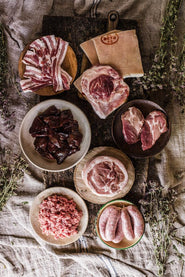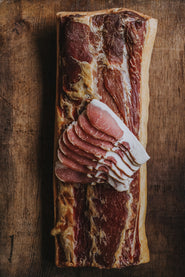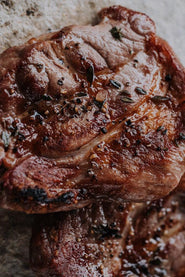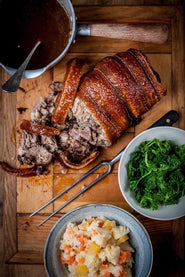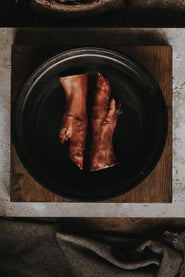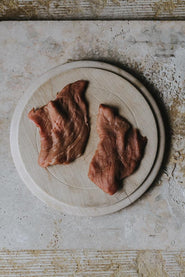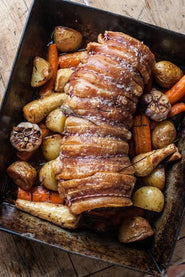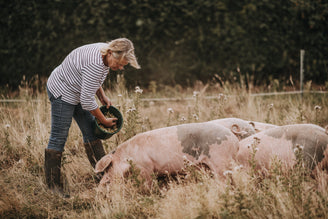British pig farming has been on a knife edge recently, with rising costs and change in government policy all making life very tough indeed for our farmers. Another blow has rocked the industry, it is reported that in 2022 all of the UK’s 11 native pig breeds are now considered so rare that they are at risk of extinction.
Historically one of our most successful and most popular pigs, the Large White, also known as ‘the Yorkshire Pig’, is now in dire straits. Numbers have plummeted from more than 900 pigs in the year 2000, to just 125 today, moving this formally prolific pig into the Rare Breeds Survival Trust’s (RBST) highest priority category.
RBST Chief Executive Christopher Price said: “The pig industry has had an awful year and the situation for native pigs is very concerning, with the decline in Large Whites seven of our 11 native pig breeds are now priority breeds”
The Rare Breeds Survival Trust has a mission to protect the diversity of our native breeds. They save genetics in a UK National Gene Bank and promote the breeding and registration of rare and native breeds.
With rare breeds under such threat of extinction we are greatly at risk of reducing genetic diversity in our herds, which is crucial for combating disease. Studies have shown that native breeds have significantly more genetic resistance to animal diseases than ‘commercial’ or ‘hybrid’ pigs. With global outbreaks of swine flu on the rise and an increase in zoonotic diseases, it is imperative that we are able to build resilience in our herds so they are capable of adapting to todays challenges.

We are on the precipice of the largest demise to food culture. With too much control in the hands of too few, it’s easy to see how corporate greed has led us down the path of homogenisation and the destruction of homegrown food security and with that, our cultural identity.
"The source of much of the world’s food, is mostly in the control of just four corporations; most global pork production is based around the genetics of a single breed of pig." says Dan Saladino, author of bestseller, Eating to Extinction.
Much of the pork found on UK supermarket shelves comes from the same global supply chain, rearing fast growing ‘commercial' pigs. The pork may appear cheaper than native breeds from a local butcher, farm shop or online service, however there are hidden costs that are not reflected in the purchase price. The majority of this pork is imported and can only be produced at such low costs by disregarding animal welfare laws, over-using antibiotics and polluting the air and water. 58% of supermarket pork is now imported from the EU, and 70% of those imports have been produced in conditions that would be illegal in the UK. This means that UK farmers are feeling the competitive pressure from these low cost, low welfare imports, so are increasingly forced to either intensify and lower welfare standards or to give up farming.

Native breed pigs are a vital contributor to rural economies (it’s estimated their contribution is around £700 million a year), however the demand for cheap meat over the last 50 years has eroded small-scale native breed pig farmers. Those very same farmers who have the ability to restore local landscapes, improve biodiversity and help us in mitigating climate change.
Breeds that are native to our exposed uplands will fare better in these areas than breeds that are used to the sunny lowlands of Southern England. Native breeds have evolved for centuries as part of their ‘terroir’, they are hardy and well equipped to deal with the climate, soil, disease and the food source available where they are grown. They are an integral part of our rural landscape, which means they can be reared in harmony with nature, using low input systems that rely on what is available in that specific geographical area. By farming in a way that uses as few inputs as possible we can reduce our climate impact, and in many cases regenerate our landscape to put much more in than we take out. Native breeds are vital to the success of this style of agroecological farming. We should be aiming to restore diversity within our landscapes – not just for wildlife, but also for our ancient breeds that have been a part of our countryside for hundreds of years.

Not to mention the huge welfare benefits of rearing native breed pigs versus industrialised pigs.
“Industrial, indoor factory pig farming is designed to produce as much yield and profit as possible. The animals are reduced to units of production, rather than sentient beings with physical and psychological needs. The drive for efficiency and cost-effectiveness conflicts heavily with animal welfare. Most pigs raised for meat to be sold in the UK are suffering in factories that cram the animals into barren, overcrowded sheds where they are unable to express natural behaviour such as running, playing, rooting and wallowing. They are routinely dosed with antibiotics, just to keep them alive in such awful conditions.” says Tracy Worcester, Director of Farms Not Factories.
The best way to aid the survival of British rare breed pigs is to support the farmers who rear them – and in doing so you can end up enjoying some of the finest meat on earth. We need to ‘eat it, to keep it’.
“When buying, it’s all down to trusting the source. People who work as much for passion as they do profit, producers who care deeply about animal welfare, environmental impact and flavour. Provenance, traceability and peace of mind. Prices may be higher, but this is flavour to savour, meat miles removed from the pallid horrors of intensive farming. In devouring the best rare-breed meat, you not only thrill the tastebuds but keep the gene pool fizzing, too.” says food writer Tom Parker-Bowles.
We all have a superpower, and that’s the power of consumer demand. With this power, we can change the shape of our countryside by supporting native breed farmers who practice sustainable and regenerative agriculture.

At Pipers Farm we only rear native breed pigs. As well as a parcel of Saddleback pigs that we rear at Pipers Farm HQ, we also work directly with 3 absolutely incredible family farms who rear; native breed Saddlebacks crossed with native breed Welsh boars. Native breed Tamworths crossed with native breed Hampshire boars. Finally, native breed pure Welsh Blacks.
For over thirty years it has been our mission to support family farms, rearing native breeds, in harmony with nature. Now, more than ever, our farmers need your support.

